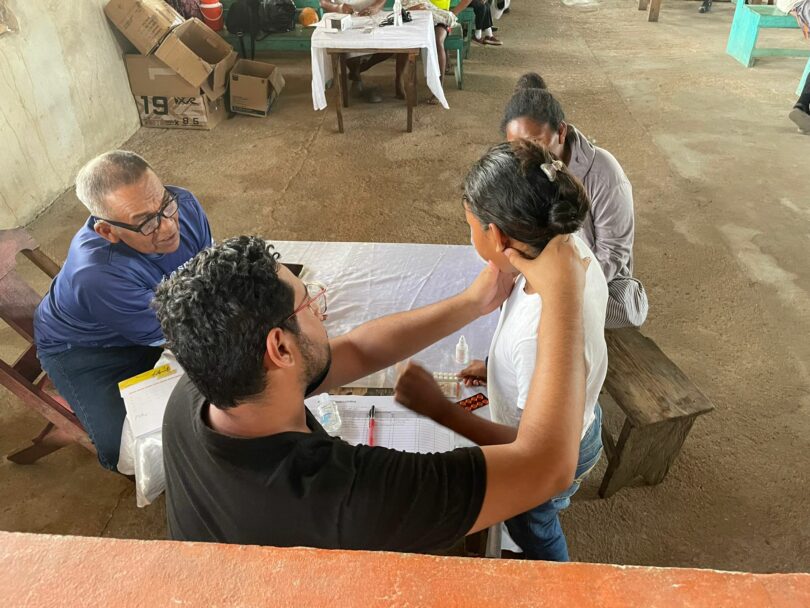God’s Image is Love
by Bishop Chris Giesler
Preaching Text: Matthew 22:15-22
Since he arrived in Jerusalem on what we call Palm Sunday, Jesus has been very busy, and it is only Tuesday! He first clears the temple of money changers and sacrificial animal dealers who have set up shop in the place of prayer for Gentiles. Jesus wants them to have their place to pray. Next, Jesus returns to the Temple, where he tells a series of difficult parables that we have discussed in the past few weeks: the parable of two sons, a parable about greedy farmhands, then a story about ungrateful wedding guests and somebody who shows up without the right clothes on. So, what happens next? They ask Jesus about taxes.
In today’s text, representatives from the Pharisees and the Herodians are trying to entrap Jesus. We need to mention that these two groups usually had little use for each other since one supported the Roman rule which gave Herod’s family their power, and the other detested the Roman occupation. But as much as they disliked each other, they both had more of a reason to want Jesus publicly embarrassed, if not eliminated. So, they joined forces to try and keep Jesus from capitalizing on his warm welcome into the city the previous Sunday. To do this, they decided to trick Jesus into taking a stand on a subject guaranteed to get him into trouble. This would be the classic “gotcha question,” in which he would get people angry no matter what answer Jesus gave. So, they ask: “Is it lawful to pay taxes to the emperor or not?” If Jesus said “No,” he could be arrested and turned over to the Romans. This would upset all of the Herodian supporters. If he said “Yes,” he would lose many of his Jewish supporters who hated the Roman tax. From their point of view, it would have been their hope that Jesus could lead a revolt and get them out of paying this oppressive tax. Either way, these groups would get their wish to see Jesus discredited.
In response to the question, Jesus asks for a coin, a denarius. This coin amounted to a day’s wage for most people. It was also the coin used to pay their taxes to Rome. Jesus asked the people to identify the image found on the currency. “The emperor’s,” they said. “Very well,” said Jesus, “Give therefore to the emperor the things that are the emperors and give to God the things that are God’s” (v. 21). With that answer, Jesus put responsibility for one’s conduct back on the individual. Each one would decide how to respond. And with this brilliant answer, folks went away amazed.
The first thing Jesus does here is acknowledging that citizens owe some things to their government. For us today, one of those things is obedience to its laws. Obeying the law sometimes means we must abide by restrictions on our actions for the sake of the common good. This is most clearly seen in the laws governing how we drive. We drive on the right; we try to obey speed limits (within reason), traffic lights, and stop signs. It would be chaos on the roads if we all drove by our whims.
In like manner, we should rightfully pay our taxes that pave roads, pay for first responders, build schools, provide trash removal, and assure us of water and sewer services. We are called to be responsible citizens and live as people who contribute to the good of our communities. As Jesus says, give to Caesar the things that are Caesar.
Even more importantly, Jesus also says, “Give to God the things that are God’s.” Genesis chapter 1 tells us that when God created humans, he created us in his image:
So God created humankind in his image,
in the image of God he created them;
male and female he created them. (Genesis 1:27)
Could any statement carry more meaning than that? God created all of humanity stamped with the divine image deep within us. How might this statement cause us to look at ourselves? How might this statement cause us to look at each other, especially those who differ in thought, faith, and orientation? This is profound if we see God as the beginning point of love extended into the world. The familiar words of John 3:16 assure us that God sent Jesus the Christ into the world because of love! That love began when God created us in God’s image! This is truly amazing! And if we can manage to believe this about ourselves, we must also allow it to influence how we look at others. How can we hate what bears God’s image? How can we discriminate against what bears God’s image? How can we shun what bears God’s image? How can we kill what bears God’s image? How can we do anything but forgive what bears God’s image?
The first step in helping us find a motivation to do mission in the world is to see others as bearing the image of God. When we see others suffer, our hearts are broken because no one bearing God’s image should have to go hungry, thirsty, homeless, or lack clothing and shelter.
Give to the world what the world deserves, but give to God that which bears God’s image, our very soul, our every intention, our compassion, and our love.







